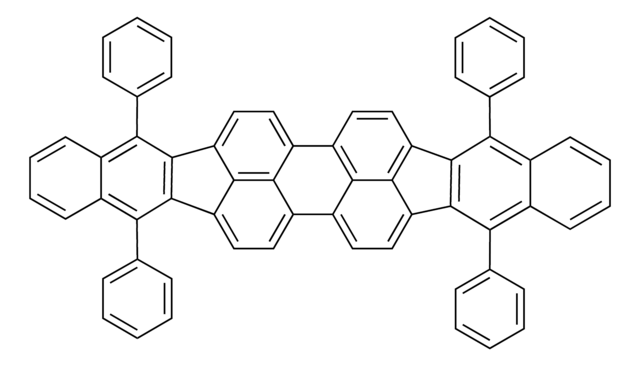684848
Pentacene
sublimed grade, ≥99.9% trace metals basis
About This Item
Recommended Products
grade
sublimed grade
Quality Level
Assay
≥99.9% trace metals basis
form
powder
mp
372-374 °C (subl.)
solubility
organic solvents: slightly soluble(lit.)
Orbital energy
HOMO 5 eV
LUMO 3 eV
OPV Device Performance
ITO/pentacene/C60/BCP/Al
semiconductor properties
P-type (mobility=0.4-3 cm2/V·s) (on/off ratio=1E5-1E8)
SMILES string
c1ccc2cc3cc4cc5ccccc5cc4cc3cc2c1
InChI
1S/C22H14/c1-2-6-16-10-20-14-22-12-18-8-4-3-7-17(18)11-21(22)13-19(20)9-15(16)5-1/h1-14H
InChI key
SLIUAWYAILUBJU-UHFFFAOYSA-N
Looking for similar products? Visit Product Comparison Guide
General description
Storage Class Code
11 - Combustible Solids
WGK
WGK 3
Flash Point(F)
Not applicable
Flash Point(C)
Not applicable
Personal Protective Equipment
Choose from one of the most recent versions:
Certificates of Analysis (COA)
Don't see the Right Version?
If you require a particular version, you can look up a specific certificate by the Lot or Batch number.
Already Own This Product?
Find documentation for the products that you have recently purchased in the Document Library.
Customers Also Viewed
Articles
Flexible electronic circuits and displays based on organic active materials are future generations of products that may eventually enter mainstream electronics market.
Highly reducing or oxidizing species enhance organic semiconductor conductivity by reducing charge-carrier injection barriers.
Silylethyne substitution offers an opportunity to tune solubility for application-specific needs and self-assembly for electronic performance and has yielded semiconductors with excellent device performance.
Flexible electronic circuits, displays, and sensors based on organic active materials will enable future generations of electronics products that may eventually enter the mainstream electronics market.
Our team of scientists has experience in all areas of research including Life Science, Material Science, Chemical Synthesis, Chromatography, Analytical and many others.
Contact Technical Service
![Benz[b]anthracene sublimed grade, 99.99% trace metals basis](/deepweb/assets/sigmaaldrich/product/structures/197/885/3a015625-5e09-4f15-8b17-4cc285304fc7/640/3a015625-5e09-4f15-8b17-4cc285304fc7.png)

![[5,6]-Fullerene-C70 sublimed, ≥99% (HPLC)](/deepweb/assets/sigmaaldrich/product/structures/316/205/6bbd4872-2192-4042-bd5c-a2b6c4edba43/640/6bbd4872-2192-4042-bd5c-a2b6c4edba43.png)


